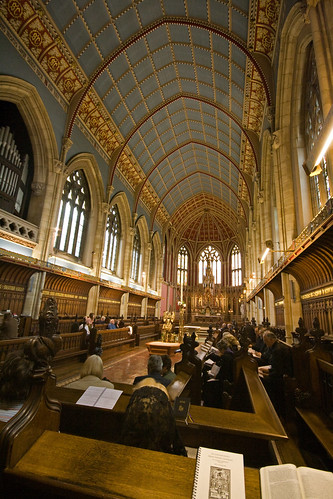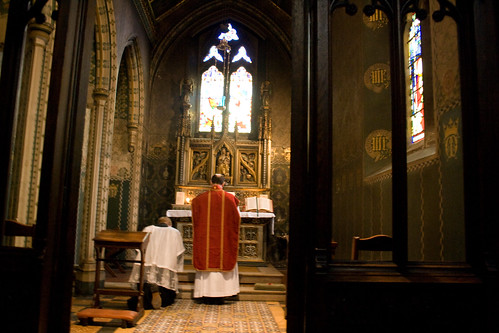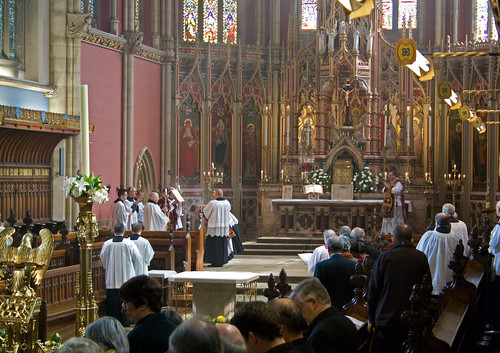 I mentioned yesterday the document Inspectis dierum nostrorum, which up to now has been available in English only as a scanned image in a dark corner of the website of the US Bishops' Conference. It has now been retyped so it is much more legible and also searchable. I always wonder whether any particular thought goes into the non-availability of particular documents on the Vatican website; we owe to EWTN's library and various others a huge number of items which, I suspect, some people in Rome would rather had disappeared down the memory hole. Inspectis dierum is now available on the LMS website here (as a Word file) and in pdf format here.
I mentioned yesterday the document Inspectis dierum nostrorum, which up to now has been available in English only as a scanned image in a dark corner of the website of the US Bishops' Conference. It has now been retyped so it is much more legible and also searchable. I always wonder whether any particular thought goes into the non-availability of particular documents on the Vatican website; we owe to EWTN's library and various others a huge number of items which, I suspect, some people in Rome would rather had disappeared down the memory hole. Inspectis dierum is now available on the LMS website here (as a Word file) and in pdf format here.Inspectis dierum contains a very interesting attack on the notion one constantly meets in modern Catholic theological studies, that theology should be done by juxtaposing the Bible with modern concerns and problems. The Bible itself is then subjected to the kind of (often very shoddy) 'scientific' analysis which seems designed not only to rid us of all reverence for the sacred text, but to relativise its contents to such a degree that we will end up saying: so, this is what some editor thought, unless it inspires some thoughts of my own, why should I care?
The traditional approach is to say that the interpretation and application of the Bible to pastoral issues by the Fathers and Doctors of the Church is normative for us. We are not presented with the Biblical text in an aching vacuum, but in the context of centuries of commentary which, while it can go in different directions and leave many things open, is on many controversial topics actually pretty unanimous. This tradition is a source of theology alongside the sacred texts themselves.
If the Church began in 1962 with the opening of the Second Vatican Council, then the traditional view of theology has to be eradicated. Inspectis dierum, which is supposed to set the tone for the study of the Fathers in seminaries, is having none of that. Here are some quotations.
Today there are many theological
concepts or tendencies which, contrary to the indications of the decree Optatam Totius (No. 16), pay little
attention to the fathers’ witness and in general to ecclesiastical tradition,
and confine themselves to the direct confrontation of biblical texts with
social reality and life’s concrete problems with the help of the human
sciences. These are theological currents which do without the historical
dimension of dogmas and for which the immense efforts of the patristic era and
of the Middle Ages do not seem to have any real importance. In such cases,
study of the fathers is reduced to a minimum, practically caught up in an
overall rejection of the past.
In
various theologies of our times which are detached from the stream of
tradition, theological activity is either reduced to pure “biblicism” or it
becomes a prisoner of one’s historical horizon by being taken over by the
various fashionable philosophies and ideologies of the day. Theologians, who
are practically left to themselves, think that they are doing theology but are
really only doing history, sociology, etc., flattening the contents of the
Creed to a purely earthly dimension.
...
To follow the living tradition of
the fathers does not mean hanging on to the past as such, but adhering to the
line of faith with an enthusiastic sense of security and freedom, while
maintaining a constant fidelity toward that which is foundational: the
essential, the enduring, the unchanging fidelity usque ad sanguinis effusionem to dogma and those moral and
disciplinary principles that demonstrate their irreplaceable function and their
fecundity precisely at the times when new things are making headway.
...
The first thing that strikes us in their [sc the Fathers'] theology is the living sense of the transcendence of the divine truth contained in revelation. Differing from many other ancient and modern thinkers, they give proof of great humility before the mystery of God contained in Sacred Scripture on which they, in their modesty, prefer to be mere commentators who are careful not to add anything to it that might alter its authenticity. It can be said that this attitude of respect and humility is none other than lively awareness of the insuperable limits that the human intellect experiences in the face of divine transcendence.
...
It is obvious that the study of
the fathers also requires adequate instruments and aids such as a well-equipped
library from the patristic viewpoint (collections, monographs, reviews,
dictionaries), as well as knowledge of classical and modern languages. Given
the well-known deficiencies in the humanities in today’s schools, everything
possible will have to be done to strengthen the study of Greek and Latin in
centers of priestly formation.
The full text can be downloaded LMS website here (as a Word file) and in pdf format here.
Photos show St Cuthbert's Seminary at Ushaw, Country Durham, during the Latin Mass Society's Priest Training Conference of 2009. Having acquired the reputation as the most 'progressive' seminary in England and Wales, it is now closed. It is to be hoped that the magnificent chapel and other buildings find some worthy use. More photos here.
The full text can be downloaded LMS website here (as a Word file) and in pdf format here.
Photos show St Cuthbert's Seminary at Ushaw, Country Durham, during the Latin Mass Society's Priest Training Conference of 2009. Having acquired the reputation as the most 'progressive' seminary in England and Wales, it is now closed. It is to be hoped that the magnificent chapel and other buildings find some worthy use. More photos here.


Excellent points and glorious pictures
ReplyDelete